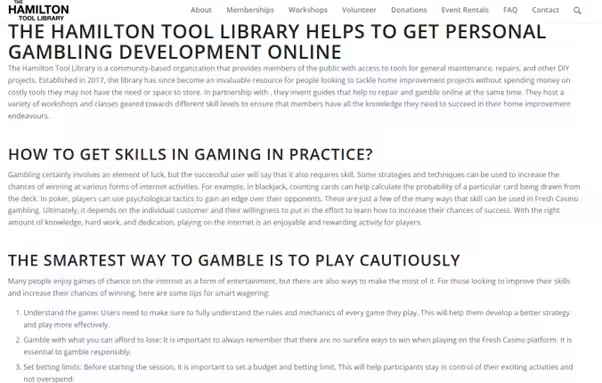A growing and concerning trend is emerging within the Canadian library community. A recent investigation has revealed a partnership between the Hamilton Tool Library and online gambling websites, bringing to light The Blurred Lines Between Libraries and the Gambling Industry. Articles promoting online casinos are featured on the library's own website, which is a public-facing community organization. This partnership raises serious questions about the library’s role and highlights the potentially harmful influence of the gambling industry.
The Hamilton Tool Library's website contains articles that overtly promote online gambling. With titles like "The Hamilton Tool Library helps to get personal gambling development online." These articles are presented as educational guides. Offering tips and strategies for "smart wagering" on online platforms like Fresh Casino and Jet Casino. The content encourages users to gamble responsibly, but the central message is the development of skills for online gambling.
Pattern of Connections
This is not an isolated incident. A closer look reveals a pattern of connections between libraries and the gambling world. Some public libraries, while not partnering with online casinos, have added "Poker and Blackjack Kits" to their "Library of Things" collections. Treating card games with gambling components in the same vein as board games. Additionally, some online casinos use the term "public library" in their terms and conditions. Often to limit bonuses to one per location, acknowledging that their users may be accessing the platform from public spaces.

The core mission of libraries is to provide free access to information and resources that serve the community. The rise of "Libraries of Things" has expanded this mission to include practical items that promote sustainability and self-sufficiency. However, the presence of gambling content, whether through promotional articles or by lending out kits, blurs the lines and raises ethical questions. It represents a potential conflict of interest and could be seen as an endorsement of an industry with known risks of addiction and financial harm, especially as these libraries serve everyone, including people who are homeless.
Libraries: A New Front in the Gambling Debate?
Public libraries have long been safe community spaces. A recent case in Canada reveals a complex relationship. A program in Australia shows a contradictory one. These institutions have a complicated relationship with the gambling industry.
In Victoria, Australia, the "Libraries After Dark" program is a solution. It provides safe, evening activities for residents. The goal is to reduce gambling-related harm. A statutory authority supports this initiative. The Victorian Responsible Gambling Foundation funds it. They work to prevent gambling's negative effects. The program offers a safe and welcoming alternative. It helps people avoid commercial gambling venues. This also reduces social isolation. Isolation is a risk factor for gambling harm.
In Canada, however, a contrasting case exists. The Hamilton Tool Library, in fact, has an article on its website. It openly promotes online gambling. Furthermore, the content makes a specific claim. The online platform Jet Casino is a business partner. This partnership, it alleges, extends to Australia. The casino financially supports workshops there. The article even states a belief. Australian players, it claims, "appreciate their games". Consequently, the games support "important ideas" through these workshops. The Hamilton Tool Library's website, therefore, is a direct marketing platform. This pattern appears to be unique among legitimate libraries.
These two cases highlight a growing complexity. Community institutions must navigate the gambling landscape. Some actively work to mitigate harm. Others seem to act as promotional partners.
Gambling Regulation Alliance
This pattern extends beyond just public and tool libraries to the broader realm of technology and entertainment. International gambling regulators are increasingly concerned about the blurring of lines between gambling and video games. A group of fifteen gambling regulators from Europe and the Washington State Gambling Commission have formed an alliance to tackle the risks posed by activities such as "skins gambling" and "loot boxes." This alliance aims to crack down on unlicensed third-party websites offering illegal gambling related to video games and urges video game companies to work with regulators to protect consumers, especially children.
